Why You Need a Broker for Trading
Discover why brokers are essential for trading forex, crypto, and stocks. Learn about their market access, tools, expertise, and how they simplify the trading process.
 Writen by:
Arslan Ali But
17 January 2025
8 minutes read
Writen by:
Arslan Ali But
17 January 2025
8 minutes read

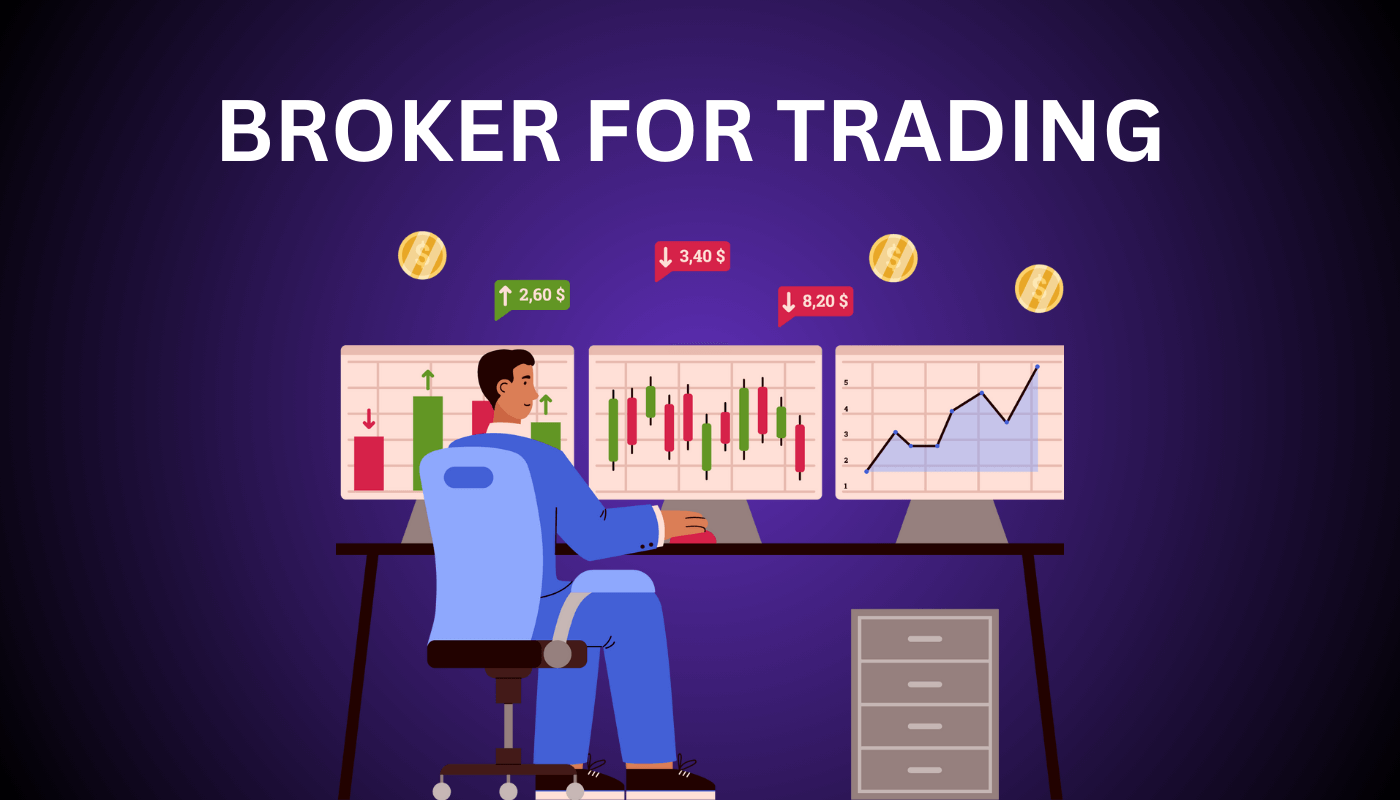
Trading in financial markets isn’t as simple as picking an asset off a shelf. To access markets, execute trades efficiently, and navigate regulatory requirements, you need a broker. Brokers act as licensed intermediaries, connecting you to global markets like forex, stocks, and crypto.
With modern platforms, advanced tools, and expert insights, brokers make trading accessible and manageable for everyone. Platforms like WhereToTrade can help match you with a broker tailored to your goals and needs.
What Is a Broker in Trading?
A broker is a licensed individual or company that facilitates the buying and selling of financial instruments like stocks, forex, cryptocurrencies, and commodities. There are three primary types of brokers:
- Full-Service Brokers: Offer a range of services, including portfolio management and investment advice, often ideal for investors handling significant funds.
- Discount Brokers: Provide lower fees and focus on executing buy/sell orders, suitable for budget-conscious traders.
- Online Brokers: Operate digitally, providing convenience, speed, and tools for modern trading.
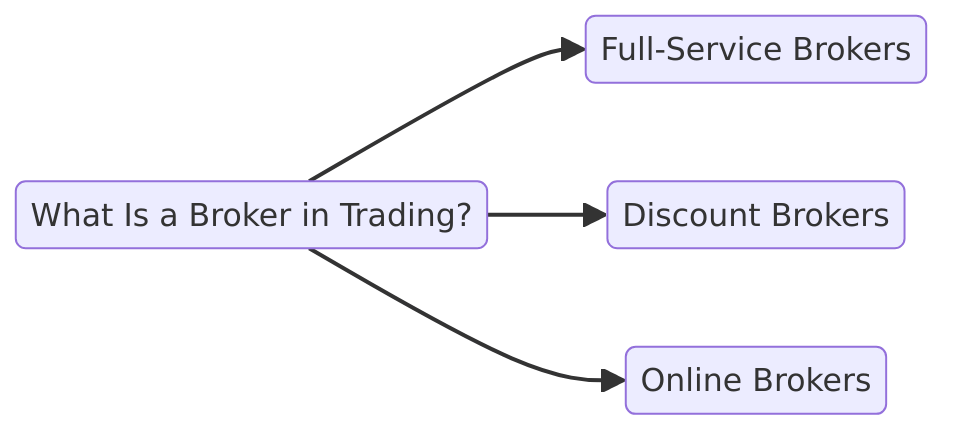
Why Do You Need a Broker?
- Market Access: Brokers provide entry to markets like forex, crypto, and stocks, often including international markets for portfolio diversification.
- Trading Platforms and Tools: Proprietary or third-party platforms equipped with advanced features, indicators, and multiple order types.
- Online Brokers: Full-service brokers offer investment advice, portfolio management, and risk analysis.
- Convenience: Brokers streamline trading by handling transactions, record-keeping, and compliance.
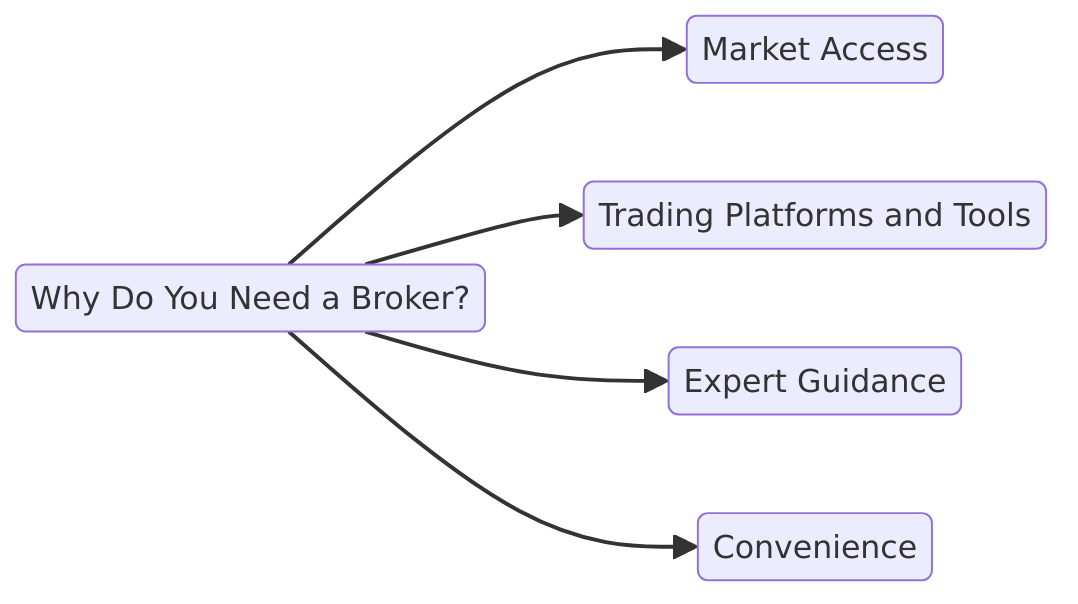
Benefits of Using a Broker
- Market Liquidity: Brokers ensure smooth trade execution through their connections with liquidity providers.
- Leverage Options: Margin accounts allow traders to control larger positions, amplifying profit potential.
- Risk Management: Tools like stop-loss orders help manage market risks.
- Education Resources: Webinars, tutorials, and research reports make brokers valuable for learning.
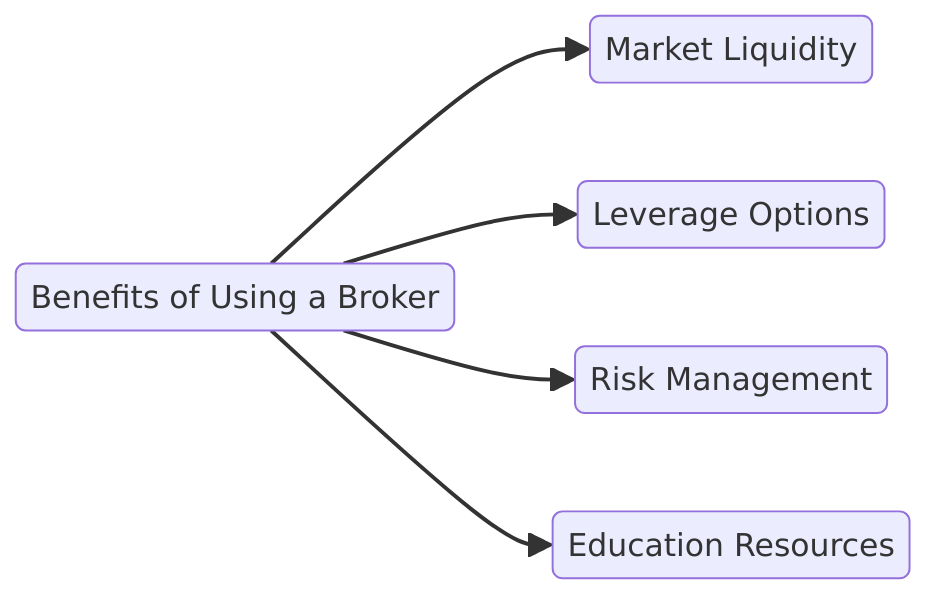
Can You Trade Without a Broker?
Yes, you can trade without a broker, but it comes with significant drawbacks. Without a broker,
accessing major markets like forex, stocks, or crypto becomes challenging. Brokers provide direct
market access through established relationships, making it easier to buy and sell assets like Tesla
(TSLA) shares or EUR/USD currency pairs.
Trading independently often means higher transaction costs due to the lack of volume
discounts brokers offer. Additionally, you’ll miss out on professional-grade tools such as advanced
charting, technical indicators, and risk management features, which are critical for effective
strategies.
Without a broker’s guidance or resources, understanding market trends and financial data can
be overwhelming, increasing the risk of poor decisions.
For a smoother trading experience, brokers offer the tools, market access, and support you
need. Unsure where to start? WhereToTrade can help you find a broker tailored to your goals and
trading style.
Choosing the Right Broker for Your Trading Needs
Regulation and Security
Ensure your broker is regulated by reputable authorities, such as the Financial Conduct Authority (FCA) in the UK or the Securities and Exchange Commission (SEC) in the US. This oversight safeguards your investments.
Fees and Commissions
While many brokers offer commission-free trades, be mindful of other potential fees, including:
- Account maintenance fees
- Withdrawal charges
- Inactivity fees
Evaluate the fee structure to ensure it aligns with your trading frequency and investment size.
Trading Platforms
A reliable and user-friendly trading platform is essential for a successful trading experience. Platforms act as the interface between traders and financial markets, offering tools to execute trades, analyze market trends, and manage risk effectively.

When selecting a platform, consider these features:
- Real-Time Data: Access to up-to-date market prices and news ensures you can react quickly to changes.
- Advanced Charting Tools: Look for platforms with customizable charts and indicators like moving averages, Fibonacci retracements, or stochastic oscillators to perform detailed technical analysis.
- Mobile Accessibility: Platforms with robust mobile apps enable you to monitor and trade on the go, ensuring you never miss an opportunity.
Popular Trading Platforms:
- MetaTrader 4 (MT4): Ideal for forex traders, offering advanced technical analysis tools, automated trading capabilities through Expert Advisors (EAs), and a user-friendly interface.
- MetaTrader 5 (MT5): A multi-asset platform supporting stocks, commodities, and forex, with additional features like a built-in economic calendar and improved order execution.
- TradingView: Known for its extensive charting tools and social trading features, allowing users to share strategies and follow other traders.
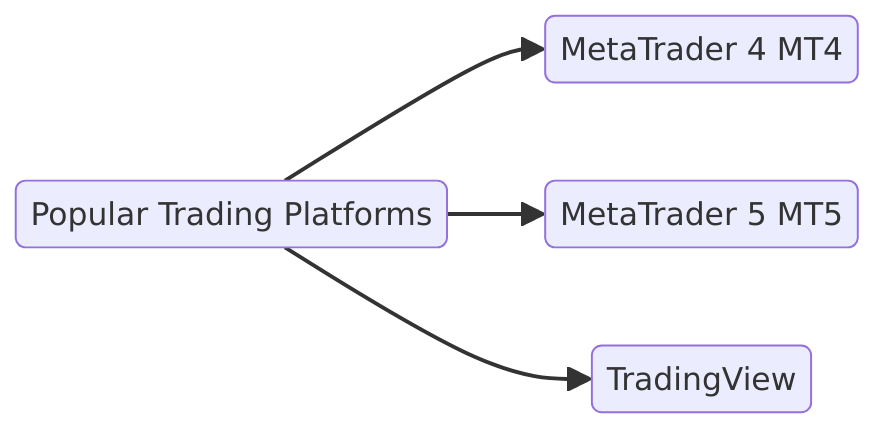
Customer Support
Responsive and knowledgeable support can be invaluable, especially during critical trading moments. Test the broker's support channels to assess their effectiveness.
Product Offerings
The variety of products a broker offers is crucial for aligning with your trading goals. Ensure the broker provides access to the financial instruments and markets you want to trade. For example:
- Stocks: If you're interested in blue-chip companies like Apple (AAPL) or emerging startups, confirm the broker supports stock trading on major exchanges like NYSE or NASDAQ.
- Forex: For currency trading, check for access to popular pairs like EUR/USD or GBP/JPY, and ensure the broker supports minor and exotic pairs for diversification.
- Commodities: If you plan to trade commodities like gold or crude oil, verify their availability alongside tools for analyzing price trends.
- Cryptocurrencies: For digital assets like Bitcoin (BTC) or Ethereum (ETH), choose brokers offering 24/7 trading access and competitive fees.
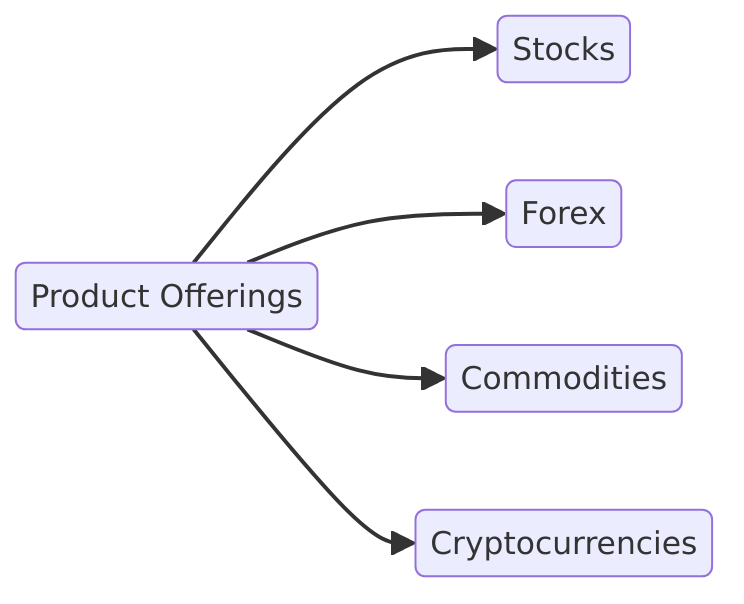
Leverage Options
Leverage allows traders to control larger positions with a smaller capital investment, increasing both potential gains and risks. When considering leverage options, evaluate the broker’s ratios and their alignment with your trading strategy.
- Forex Leverage: Many brokers offer leverage up to 1:500 for forex trading. For example, with $1,000 in your account, you could trade positions worth $500,000. This magnifies gains but also increases risk.
- Crypto Leverage: Leverage ratios for crypto trading are usually lower, such as 1:10, due to high market volatility. For instance, a trader with $100 can control a $1,000 Bitcoin position.
- Stock Leverage: Leverage for stock trading varies, often up to 1:5. For example, with $2,000 in your margin account, you could buy $10,000 worth of shares.
Before using leverage, understand its risks. High leverage can result in significant losses, so ensure the broker provides adequate risk management tools like stop-loss orders to mitigate exposure.
Educational Resources
Educational resources are invaluable, especially for beginners aiming to develop their trading knowledge and skills. A broker that prioritizes education can significantly enhance your trading journey. Look for offerings like:
- Webinars: Brokers like eToro often host live webinars where experts discuss trading strategies, market trends, and technical analysis. For example, a webinar on using Fibonacci retracements can help you identify potential price reversals.
- Tutorials and Courses: Interactive tutorials on trading platforms like MetaTrader 4 (MT4) or MetaTrader 5 (MT5) can teach you how to execute trades, use indicators, and set stop-loss orders. For instance, a step-by-step guide to placing a forex trade on MT5 can simplify the process for a novice trader.
- Market Analysis: Access to daily or weekly market analysis reports keeps you informed about potential trading opportunities. For example, reports highlighting major economic events, such as an upcoming Federal Reserve meeting, can help you prepare for market volatility.
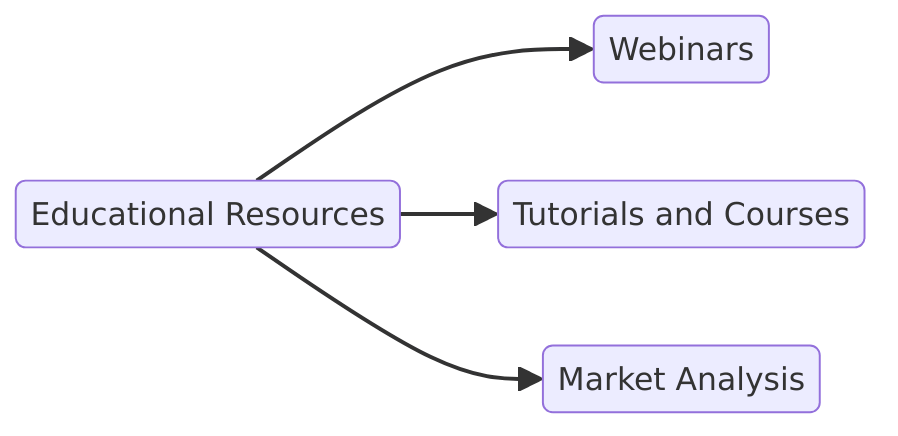
Common Mistakes When Choosing a Broker
Selecting the right broker is critical to trading success, but common pitfalls can derail your journey. Here’s what to watch out for:
- Ignoring Regulation: Always verify if the broker is regulated by reputable authorities like the SEC, FCA, or ASIC. Trading with unregulated brokers exposes you to risks like fraud, market manipulation, and unfair practices.
- Overlooking Platform Usability: A complicated or poorly designed platform can hinder your ability to execute trades effectively. For example, a non-intuitive interface may delay placing stop-loss orders, leading to unnecessary losses.
- Focusing Only on Fees: While low fees are appealing, sacrificing essential features like reliable platforms or customer support for lower costs can hurt your trading experience in the long run. Balance affordability with functionality.
- Falling for Flashy Promotions: Bonuses and promotions may seem attractive but often come with hidden terms and conditions. For instance, some bonuses require high trading volumes, which may not suit your strategy.
Conclusion
Modern brokers provide unparalleled opportunities for traders and investors, offering access to
global markets, advanced tools, and educational resources. However, the abundance of choices can
make selecting the right broker challenging.
Remember, your first broker doesn’t have to be your last. As your financial situation,
goals, and trading strategy evolve, your choice of broker may need to change too. Starting with a
reliable, well-regulated broker that aligns with your current needs can set you on the path to
long-term success.
Feeling unsure about where to begin? WhereToTrade can simplify the process by helping you
find a broker tailored to your goals, trading style, and preferences. Take the guesswork out of
broker selection and start your trading journey with confidence!
Table of contents
1. What Is a Broker in Trading? 2. Why Do You Need a Broker? 3. Benefits of Using a Broker 4. Can You Trade Without a Broker? 5. Choosing the Right Broker for Your Trading Needs 6. Conclusion






